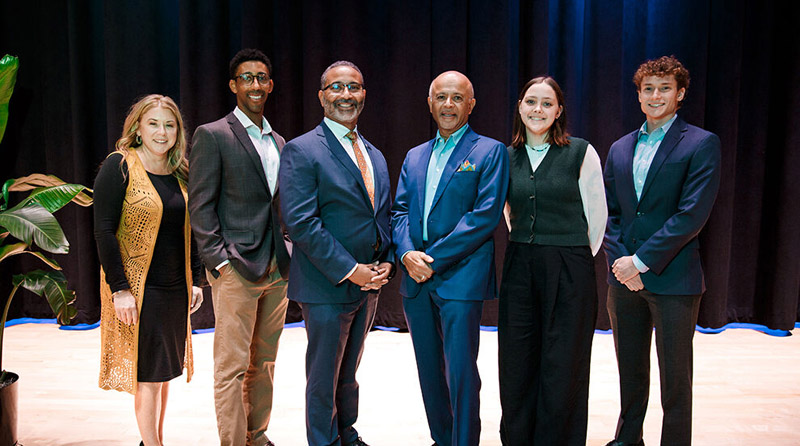Queens University Celebrates Bestselling Author Abraham Verghese
Queens University of Charlotte’s Learning Society welcomed renowned physician and bestselling author, Abraham Verghese, MD, as a featured speaker. His presentation, “The Caring in Health Care: Challenges and Opportunities in a Technological Era,” offered a unique perspective on the ever-evolving role of technology in healthcare while stressing the importance of maintaining the sacred relationship between healthcare professionals and their patients.
A leading voice in discussions about the future of quality care, Dr. Verghese, recipient of the National Humanities Medal from President Obama, is also a celebrated author. His bestselling novel, “Cutting for Stone,” remained on the New York Times bestseller list for over two years and has been translated into more than twenty languages. His latest novel, “The Covenant of Water,” also debuted as a New York Times bestseller.
“Dr. Verghese is an advocate for the patient-physician relationship and the profound role of empathy in medicine,” said Queens University President Dan Lugo. “He implores us to remember that the story of health is also the story of humanity. While we at Queens celebrate innovation and its potential, we remain committed to ensuring our students never lose sight of the human connection at the heart of caregiving.”
Prior to the main event, Dr. Verghese participated in a student-led discussion in which he shared compelling stories about his experiences. “I think the most important element for anyone in healthcare is to not lose their humanity,” he said. “When you start looking at people as data, something gets lost.”
Patricia Koplas, Ph.D., PT, chair of the biology and chemistry department and pre-health advisor, echoed this sentiment. Her “Interfaith Competency for Health Professions” course teaches students to understand and respect patients’ religious practices to build stronger patient-provider relationships.
“A crucial first step for caregivers is simply asking patients about any important observances or traditions that might influence their healthcare decisions,” Koplas explained. “This fosters a stronger, more effective clinical relationship. However, maintaining this focus can be challenging given the pressures of understaffed clinical settings, where providers often feel compelled to prioritize speed and efficiency.”
Gabriel Anderson ’25, a pre-med student minoring in bio-medical ethics and a Belk Chapel Davies Fellow, found Dr. Verghese’s message resonated with Koplas’ teachings. “Improving patient outcomes starts with respect,” he said. “Whether it be understanding one’s spiritual identity or spending a few extra minutes conducting a thorough physical exam, these things are essential to providing compassionate, empathetic care.”
Reflecting on his time at Queens, Anderson added, “I’m grateful for the experiences and opportunities I’ve had here and the relationships I’ve built, especially with Dr. Koplas, whose guidance has been instrumental in preparing me for my future in healthcare.”
With commencement quickly approaching, Anderson reflected on his time at Queens. “I’m grateful for the opportunities I’ve had here. I’ve built meaningful relationships with my classmates and professors, in particular Dr. Koplas. Her guidance has provided a strong foundation for my future in healthcare.”
Pre-med student Thien Trang Nguyen ’26, who is majoring in biology and minoring in psychology, also found the discussion with Dr. Verghese valuable. “I’ve learned that compassionate care involves more than just understanding the basics of medicine,” Nguyen said. “Understanding and considering patients’ unique experiences—such as their cultural values and religious beliefs—is essential in providing tailored care and fostering trust. Subjective measures of health are equally crucial and Dr. Verghese’s insights highlighted the importance of recognizing these aspects in patient care.”
Dr. Verghese’s visit to Queens served as a powerful reminder of the enduring values at the heart of healthcare. By emphasizing the crucial role of human connection alongside technological advancements, he reinforced Queens’ commitment to educating compassionate and skilled healthcare professionals while prioritizing the patient in an increasingly complex medical landscape. The insights shared by Dr. Verghese, coupled with a dedicated faculty, demonstrate Queens’ dedication to shaping the future of healthcare, one student at a time.
Through the generous support of its members, the Learning Society has provided new perspectives, inspiration, and transformative leadership that extends the reach of a liberal arts education far beyond the classroom for nearly 40 years. To learn more, visit the Learning Society website.
Photo credit: Tricia Coyle

